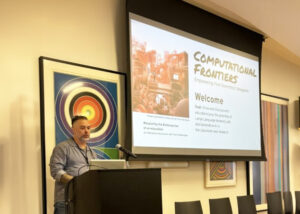Travis Masingale, an associate professor of design at EWU, recently took the stage in New York City as part of a panel at the 2023 AIGA Design Conference, one of the nation’s most prominent annual meetings of design professionals.
Masingale was selected to speak as a part of a diversity and inclusion-focused design panel, one of about 30 people chosen from a pool of 113 applicants. Speaking to several small groups of fellow innovators and educators at the October gathering, Masingale focused on the potential of Generative AI and “large language” models to amplify underrepresented voices and dismantle barriers.

Diversity, equity and inclusion is a facet of design that Masingale is particularly passionate about.
“AI can be used as a tool for diversity and inclusion,” says Masingale. As a former first-generation college student himself, Masingale is interested in using AI as a leveling agent for students who might not have easy access to higher education. “It can give students an assist.”
Systems like ChatGPT can assist students in areas like resume formatting and text comprehension. “For instance, a football player could take an article about bioscience and use Chat GPT to understand this article through football metaphors, or to explain the quadratic equation in football analogies like the parabola of a perfect pass,” Masingale explains. “AI is this great catalyst for learning.”
In his own classes, Masingale uses ChatGPT to formulate individualized rubrics for students. “Each student is able to craft a rubric for their assignment,” he says. “They’re tailored to each student’s level with technology.” Masingale uses these AI tools to effectively and efficiently teach students in ways that are meaningful to them.
Students and educators alike can use these AI features, he says. Not as a substitute for learning, but as a tool: “They can use programs like ChatGPT to become better learners. I’m hyper passionate about this.”
For those who might worry that AI will detract from classroom learning, Masingale provides reassurance. “It’s not going to do the work for us, but it can help us craft stronger work,” he says, adding that these AI systems can help students find better source materials and aid them in sifting through sources. ChatGPT can act as a template which teaches students how to become stronger writers.
“It takes 10-20 hours to become proficient in ChatGPT,” Masingale says, meaning that it takes familiarity with the system to generate quality content: “Command of the English language is important in using ChatGPT. If you’re already great at it, it makes you better.”
Beyond accessibility for students, these programs also give educators an avenue to relate to students who might otherwise be unreachable. That point in particular, he adds, ties to the overarching themes of accessibility and inclusivity in design that were discussed at the AIGA conference.
Like Masingale’s own work, the conference highlighted the ways in which these technologies can empower both students and educators.
“I’m excited and optimistic for the future of AI in design,” Masingale says. “We should be working to design a better world.”